|
|
|
Sort Order |
|
|
|
Items / Page
|
|
|
|
|
|
|
| Srl | Item |
| 1 |
ID:
121987
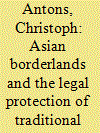

|
|
|
|
|
| Publication |
2013.
|
| Summary/Abstract |
Traditional knowledge related to biodiversity, agriculture, medicine and artistic expressions has recently attracted much interest amongst policy makers, legal academics and social scientists. Several United Nations organizations, such as the World Intellectual Property Organization (WIPO) and the Convention on Biological Diversity under the United Nations Environmental Programme (UNEP), have been working on international models for the protection of such knowledge held by local and indigenous communities. Relevant national, regional or provincial level legislation comes in the form of intellectual property laws and laws related to health, heritage or environmental protection. In practice, however, it has proven difficult to agree on definitions of the subject matter, to delineate local communities and territories holding the knowledge, and to clearly identify the subjects and beneficiaries of the protection. In fact, claims to 'cultural property' and heritage have led to conflicts and tensions between communities, regions and nations. This paper will use Southeast Asian examples and case studies to show the importance of concepts such as Zomia, 'regions of refuge' and mandala as well as 'borderlands' studies to avoid essentialized notions of communities and cultures in order to develop a nuanced understanding of the difficulties for national and international lawmaking in this field. It will also develop a few suggestions on how conflicts and tensions could be avoided or ameliorated.
|
|
|
|
|
|
|
|
|
|
|
|
|
|
|
|
| 2 |
ID:
110492


|
|
|
| 3 |
ID:
094630
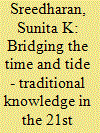

|
|
|
| 4 |
ID:
105133
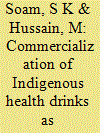

|
|
|
|
|
| Publication |
2011.
|
| Summary/Abstract |
A survey under United Nations Conference on Trade and Development project in 25 states of India identified promising indigenous drinks that merit protection as Geographical Indications (GI) including 'nannari' from Andhra Pradesh, 'kokum' from Western Ghats and 'burransh' from Uttarakhand. These are obtained from roots of Hemidesmus indicus, fruits of Garcinia indica and flowers of Rhododendron arboretum, respectively. Manufacturing procedures involving application of community traditional knowledge, and ethno-medicine properties are scientifically documented. Product acceptability by the retailers and consumers is high; hence companies would be willing to invest in such products. Here, one of the important issues to be addressed is benefit sharing with traditional knowledge holders and alleviation of their socio-economic condition. Producers are unorganized and dispersed with seasonal employment and are not known outside restricted area. Therefore, can GI be a platform for product and market development addressing socio-economic issues? The products have a sufficient niche market since per capita fruit juice consumption in India is only 20 ml. Market demand is expected to increase from 27.4 to 64 billion rupees by 2020 with 8.9 per cent market growth, with 65 per cent market share restricted to South India. In such a scenario, can registered GIs accelerate the growth through market penetration? The study offers solutions/models for GI registration and business strategy with sustainable rural livelihood development.
|
|
|
|
|
|
|
|
|
|
|
|
|
|
|
|
| 5 |
ID:
154560
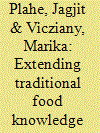

|
|
|
|
|
| Summary/Abstract |
Small farmers, who are normally dependent on marketing intermediaries, have formed themselves into co-operatives in the Indian states of Telangana, Andhra Pradesh and Maharashtra and have started to sell their produce directly to consumers via retail outlets, the Internet, urban franchises, mobile vans, rural food hubs and as branded products. The key engine for this marketing experiment is the Sahaja Aharam Producer Company Limited (SAPCO), a producer organisation. SAPCO has tried to create new supply chains that guarantee that the produce it sells complies with the quality standards needed to certify the foods as ‘organic’. SAPCO is an initiative of the Centre for Sustainable Agriculture (CSA) which has taken up the bulk of the financial and administrative burden of managing the company. The revival of traditional knowledge for organic farming and the marketing of organic produce has invariably required the intervention of external agents such as CSA. In the final section, we assess the achievements of SAPCO from the viewpoint of the small farmers who belong to the producer co-operatives that make up SAPCO's membership. Our key research question is whether it has been possible to scale up the production and marketing of small farmers’ output and create a new supply chain independent of local intermediaries.
|
|
|
|
|
|
|
|
|
|
|
|
|
|
|
|
| 6 |
ID:
154559
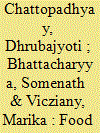

|
|
|
|
|
| Summary/Abstract |
This multi-disciplinary paper brings together two bodies of evidence that, to our knowledge, have not before been combined: literature about the efficient functioning of the East Kolkata Wetlands in the production of fish is juxtaposed against scientific research that documents the heavy metal pollution of those Wetlands caused by industries such as tanneries. Our primary question is whether it is safe to eat the fish (and other produce) of the Wetlands; a related issue is to assess the strengths and limitations of traditional knowledge. In discussing what the farmers know and what the scientists know, we have placed our work in the context of a framework developed by Richards in 1979. Our conclusions suggest that the expertise of the farmers and the expertise of the scientists can be brought together.
|
|
|
|
|
|
|
|
|
|
|
|
|
|
|
|
| 7 |
ID:
154555
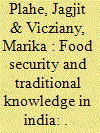

|
|
|
|
|
| Summary/Abstract |
In this first paper, we explain why traditional knowledge is an important theme in the study of Indian agriculture, especially given the crises routinely facing poor, smallholder farmers. We begin with an overview of some of the key authors who have written about the problems facing small farmers both within and outside India. Different authors have focused on different aspects of the benefits that can be derived from the local knowledge and skills of farmers, but these do not always pertain to organic farming. Our interest in organic farming is specifically about ‘traditional’ knowledge. With the industrialisation of agriculture in India and elsewhere, many poor, small farmers have been deskilled and placed into vulnerable positions. Traditional knowledge has been undermined, overwhelmed or has survived only in fragments. How ‘traditional knowledge’ might be retrieved, reinvented, reintroduced and modified so as to create a farmer-driven, sustainable and biodiverse agriculture is our concern. In the final section of this paper, we analyse the four situations we have been working on as examples of the possibilities and challenges facing the revival of ‘traditional knowledge’ in the villages of Kolkata, central India and Sikkim.
|
|
|
|
|
|
|
|
|
|
|
|
|
|
|
|
| 8 |
ID:
129199


|
|
|
|
|
| Publication |
2014.
|
| Summary/Abstract |
Imagine subsistence hunters in Brazil, or farmers in the Andean highlands, or fishing communities in Cambodia. Each of these geographically disparate groups is among the indigenous peoples of the world whose livelihoods, cultures, and identities are intimately tied to the land on which they have lived for generations. However, they do not only share this tie to their traditional land. Indigenous peoples' rights to their land, territories, and natural resources have often been historically ignored or neglected when large-scale development or conservation activities, such as hydropower dams or protected areas, were being planned and implemented.
Conservation and development activities have the potential to negatively or positively impact the rights of indigenous peoples, both at very small or very large scales. Notably, data from the Global Environment Facility (GEF) shows that land under the management of indigenous peoples only makes up 20% of the world's landmass and yet it holds roughly 80% of the Earth's remaining biodiversity. This biodiversity and related traditional knowledge, which has been maintained, used, catalogued, and respected for thousands of years by many indigenous peoples, has the potential to maintain cultures, help agricultural systems adapt to a changing climate, offer medical solutions, and inspire awe. However, anything this traditional knowledge may offer the rest of the world, including the biodiversity it has maintained, must be provided with the consent of the indigenous peoples to which it belongs.
|
|
|
|
|
|
|
|
|
|
|
|
|
|
|
|
| 9 |
ID:
125275


|
|
|
|
|
| Publication |
2013.
|
| Summary/Abstract |
Since centuries and for generations people across the globe among various communities' practice many things in their day to day life, which has serious implication on nature, environment, sustainability and availability of resources as well as utilisation at local level. Nonetheless, in the domain of traditional knowledge much has to be explored to give it a proper shape and dimension in policy level to not only preserve it but also give a legal sanction and scientific acceptance.
|
|
|
|
|
|
|
|
|
|
|
|
|
|
|
|
| 10 |
ID:
154557
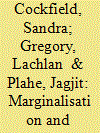

|
|
|
|
|
| Summary/Abstract |
India is in the grip of an agrarian crisis. Economic, social, environmental and political forces have adversely affected the relationship between the small-scale primary producer and the production process. In the context of this crisis, traditional knowledge-inspired food systems have given rise to ‘islands of success’ that have allowed small and marginal farmers to reclaim their livelihoods across the country. In this paper, we analyse three different islands of success using an agro-ecological framework, arguing that such islands of success based on traditional knowledge are becoming an increasingly necessary approach to agriculture. However, political will, political engagement and effective policies that support traditional knowledge in agriculture are required for these islands of success to become waves of change.
|
|
|
|
|
|
|
|
|
|
|
|
|
|
|
|
| 11 |
ID:
133551
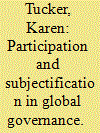

|
|
|
|
|
| Publication |
2014.
|
| Summary/Abstract |
In this article, I examine the ways in which NGO participation in global governance both relies on and produces particular forms of NGO subjectivity. Focusing on NGO interaction with WTO policy-makers in relation to ongoing policy debates about trade, intellectual property law and the protection of 'traditional knowledge' and 'biodiversity', I explore the ways in which particular forms of subjectivity are elicited and rewarded from (would-be) NGO participants in dialogue, consultation and information-sharing with the WTO. I also consider the forms of NGO subjectivity that are treated as normal, credible and acceptable in this field of global governance, and those that are constructed as undesirable and unacceptable. In doing so, I illustrate some of the forms of inclusion and exclusion that underpin the contributions that NGOs make to policy-making on traditional knowledge and biodiversity in the WTO, disrupting and complicating ideas about the qualities that NGOs bring to global governance.
|
|
|
|
|
|
|
|
|
|
|
|
|
|
|
|
| 12 |
ID:
091729
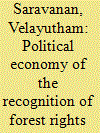

|
|
|
|
|
| Publication |
2009.
|
| Summary/Abstract |
Politics has played havoc with tribals and the environment during the post-Independence period in India. Even after fi fty years of Indian planning, deprived groups, and tribals in particular, continue to remain underdeveloped, with their living conditions deteriorating further. Taking a historical perspective, this article seeks to capture the political undercurrents of economic policy-making towards tribals and tribal development planning and specifi cally analyses the consequences of the Scheduled Tribes and Other Traditional Forest Dwellers (Recognition of Forest Rights) Act of 2006 on the environment as well as tribal development. Examining whether this new, politically motivated law will provide an impetus for economic progress of the tribals and environmental sustainability, it is argued that this Act will neither benefit the tribal communities nor enhance conservation. Rather, it serves as a cloak to justify non-tribal intervention, with potentially disastrous consequences.
|
|
|
|
|
|
|
|
|
|
|
|
|
|
|
|
| 13 |
ID:
191060


|
|
|
|
|
| Summary/Abstract |
Culture-specific knowledge plays an important role in shaping environmental conservation. Yet we lack a holistic and contemporary understanding of how such local cultural systems interface(d) with ecologies, especially in the fast-growing cities of the Global South which face profound environmental challenges. In this paper, we explore nature-based cultural systems embedded in folk-songs to understand situated social-ecological histories of human-inhabited peri-urban landscapes in the city of Bengaluru in South India. Drawing on empirical observations from the city, we trace local imageries of erstwhile lake-based social systems through folk-songs, mythologies and oral narratives. We demonstrate how many of these cultural narratives, largely embedded within symbolic linkages to the lake ecology, continue to manifest themselves as folk expressions in the city, despite the fact that most of the lakes have been polluted or are managed via restrictions that prohibit village residents from accessing them as they once did for agriculture, livelihoods and domestic use. The songs are also rich reminders of socialities, which, despite being divisive and hierarchical to a large extent, were symbolically and materially embedded in nature.
|
|
|
|
|
|
|
|
|
|
|
|
|
|
|
|
| 14 |
ID:
112740
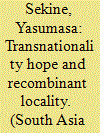

|
|
|
|
|
| Publication |
2012.
|
| Summary/Abstract |
This article searches for sustainable methods of handling the stresses of globalising existence and contrasts two strategies of using knowledge as a form of capital or resource in different forms of 'packaging from above' and 'packaging from below'. Taking the examples of appropriation of Vastuvidya in Europe and of Hindu worship of the Hawaiian Healing Stones, it is argued that such methods of re-packaging and the concept of 'recombinant locality' are strategically useful tools and devices to understand better how people may preserve glocalised spaces while opposing uniformising globalisation and capitalist domination. The article suggests that, in this way, structurally disadvantaged but hopeful and enterprising transnational individuals and groups may empower themselves to improve their 'lifeworld' in diaspora.
|
|
|
|
|
|
|
|
|
|
|
|
|
|
|
|
| 15 |
ID:
101969


|
|
|
|
|
|
|
|